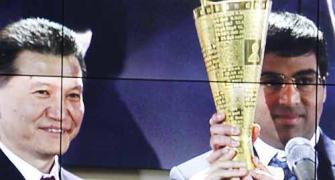Allaying apprehensions of an emerging military alliance between them, China and Russia beefed up their ties with 10 "crucial" agreements including setting up Russian nuclear plants and development of commercial aircraft and helicopters.
A closer China-Russia relationship benefits the world as well as the two nations, Chinese President Hu Jintao said playing down speculation that the two countries warmed up to deal with the new US policy to step up its military engagement in Asia-Pacific.
Russia is China's most important partner of strategic coordination and the development of relations between the two countries remains healthy and positive, Hu, who had wide ranging talks with Russian President Vladimir Putin in Beijing on Tuesday night and signed a host of agreements, said.
Putin is in China to attend the six Shanghai Cooperation Organisation member states ahead the 12th summit beginning in Beijing on Wednesday.
China and Russia are the dominant members of the alliance which comprised of Central Asian states of Uzbekistan, Kazakhstan, Tajikistan and Kyrgyzstan.
China denies any efforts to convert it into a North Atlantic Treaty Organisation style military alliance. India, Pakistan, Iran and Mongolia are observers in the SCO.
During Hu-Putin meeting, the two sides signed more than 10 key commercial contracts including setting-up a $4 billion investment fund.
Putin also said the two countries are speeding up development and research on commercial aircraft and helicopters. The commercial contracts, which Putin described as
'crucial', also include Russia building two nuclear power plants in China, and more cooperation in the electricity, tourism and energy sectors.
There is no word about any agreement on the supply of Russian natural gas which was stalled due to differences on pricing. Russia is China's major supplier of oil through pipelines. Last year Russia supplied 15 million metric tonne of oil through the pipelines .
The Russian delegation accompanying Putin includes six cabinet members, the heads of Russia's energy giants Gazprom, Rosneft and Transneft, and "all the major names of Russian business", according to the Russian media.
ussian trade with China has risen at least 40 per cent year-on-year for the last two years to reach $80 billion last year. Russian officials say that a target of $100 billion in trade by 2015 is likely to be reached ahead of time.
Though Russia supplies some of the top end defence technology including fighter aircraft, it has not fully opened it to Beijing in the past due to apprehensions of over China's mastery over re-engineering.
Putin, who is on his eighth visit since he first took up the presidency 12 years ago, said China is not only a "good friend" but a "good partner on the world platform". Putin told Hu that ties between the two nations had reached "new heights" with political trust between the two "especially high".
Putin also pledged more cooperation, especially in the military field, with China in the Asia-Pacific region. The region has seen recent changes as the US is re-emphasising its strategic focus, state-run China Daily reported.
In an apparent referenc to China-Russian coordination on Syria and Iran in UN, Hu in an interview to SCO media organisations said Beijing and Moscow which are the permanent
members of the UN Security council have safeguarded the common interests of both sides and defended the tenets of the UN Charter and the norms of international relations with closer coordination and cooperation in handling regional and international issues.
Political mutual trust has increased as Moscow and Beijing stand firm in supporting each other on issues concerning the two nations' core interests, he said.
Hu said that the two countries should accelerate high-tech cooperation and pursue strategically important large-scale projects, with policy and capital support from the governments.
Observers said the investment fund and the commercial flight projects are the key projects as both China and Russia are upgrading their economic structures.
Both leaders were determined that Annan's efforts should not be abandoned while the West was increasing pressure on the current Syrian leadership to step down. The leaders are also believed to have covered Iran and the situation on the Korean Peninsula.
Our approach is united and coordinated to solve international crises, Putin told the media after the meeting. Analysts said China-Russia ties have become a pillar for the Euro-Asia region and world peace.
"China and Russia's cooperation and coordination in a series of international affairs, such as Syria and Iran, have helped lower the risk of major wars," Sun Changhong, vice-director of the Euro-Asian Social Development Research Institute said.
Sergei Markov, vice-president of the Plekhanov Economic University in Moscow and advisor to Putin, said, "Russia finds political dialogue with China easier than with our Western counterparts, and Putin believes that Russia and China are two giants that have mutual responsibilities" to take a principled stand for things they jointly believe in.
"It's also a fact that Western economies are in crisis, while Asia is seeing growth. All this justifies the qualitative improvements we are hoping to accomplish in our relationship with China. The importance of our growing cooperation can't be stressed enough," he was quoted as saying in the official media.
According to Feng Yujun, a researcher with the China Institute of Contemporary InternationalRelations, the commercial deals show that the two countries are upgrading their bilateral trade shifting from simple trading of commodities to a comprehensive pattern.





